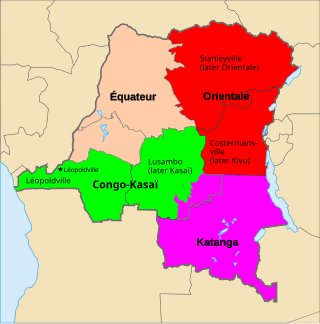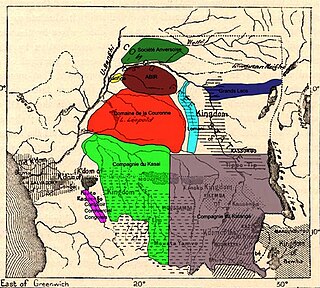
Katanga was one of the four large provinces created in the Belgian Congo in 1914. It was one of the eleven provinces of the Democratic Republic of the Congo between 1966 and 2015, when it was split into the Tanganyika, Haut-Lomami, Lualaba, and Haut-Katanga provinces. Between 1971 and 1997, its official name was Shaba Province.

The Congo Free State, also known as the Independent State of the Congo, was a large state and absolute monarchy in Central Africa from 1885 to 1908. It was privately owned by King Leopold II, the constitutional monarch of the Kingdom of Belgium. In legal terms, the two separate countries were in a personal union. The Congo Free State was not a part of, nor did it belong to Belgium. Leopold was able to seize the region by convincing other European states at the Berlin Conference on Africa that he was involved in humanitarian and philanthropic work and would not tax trade. Via the International Association of the Congo, he was able to lay claim to most of the Congo Basin. On 29 May 1885, after the closure of the Berlin Conference, the king announced that he planned to name his possessions "the Congo Free State", an appellation which was not yet used at the Berlin Conference and which officially replaced "International Association of the Congo" on 1 August 1885. The Free State was privately controlled by Leopold from Brussels; he never visited it.

The Société Anversoise was a concession company of the Congo Free State, headquartered in Antwerp. It was, with the Lulonga Company and the Abir Congo Company, one of the main producers of rubber in the Free State. Alongside Abir and the Lulonga Company the Société Anversoise handed back control of the concession to the Congo Free State in 1906. The Société Anversoise merged with Abir in 1911 to form the Compagnie du Congo Belge with a focus of the management of rubber plantations instead of the harvesting of naturally occurring rubber. The Société Anversoise was quoted on the Antwerp Stock Exchange from 27 July 1898.

The Lulonga Company was a concession company of the Congo Free State. It was, with the Société Anversoise and the Abir Congo Company, one of the main producers of rubber in the Free State. The company's rubber production declined in the early 20th century as a result of over harvesting of the natural rubber vine and the entire concession produced just seven tons of rubber in 1905. Like Abir and the Société Anversoise, the Lulonga Company handed back control of the concession to the Congo Free State in 1906.

The Grands Lacs Company was a concession company of the Congo Free State.
The Compagnie du Kasai was a Belgian company established to exploit the resources of the Kasai River basin in the Congo Free State. At first it was mainly involved in harvesting wild rubber, but later moved into palm oil and mining.

The Compagnie du Katanga was a concession company of the Congo Free State that engaged in mining in the Katanga Province.

The Comptoir Commercial Congolais was a concession company of the Congo Free State, which was in personal union with Leopold II of Belgium.

The Abir Congo Company was a company that exploited natural rubber in the Congo Free State, the private property of King Leopold II of Belgium. The company was founded with British and Belgian capital and was based in Belgium. By 1898 there were no longer any British shareholders and the Anglo-Belgian India Rubber Company changed its name to the Abir Congo Company and changed its residence for tax purposes to the Free State. The company was granted a large concession in the north of the country and the rights to tax the inhabitants. This tax was taken in the form of rubber obtained from a relatively rare rubber vine. The collection system revolved around a series of trade posts along the two main rivers in the concession. Each post was commanded by a European agent and manned with armed sentries to enforce taxation and punish any rebels.
The Mbole people are an ethnic group of about 150,000 people living in the Orientale Province, southwest of Kisangani in the Democratic Republic of the Congo. The Mbole were previously referred to as Bambole.
Lokilo is a community in the Opala Territory of the Tshopo Province of the Democratic Republic of Congo.
Ilambi is a community in the Tshopo Province of the Democratic Republic of the Congo, on the Lomami River. It is 20 kilometres (12 mi) to the south of the point where the Lomani enters the Congo River. Most of the inhabitants are Topoke people.

The Topoke people are an ethnic group that live in the Isangi Territory south of the Congo River, downstream from Kisangani in the Tshopo Province of the Democratic Republic of the Congo. They speak the Poke language, in the Soko–Kele languages group of Bantu languages.
Yaboila is a village in the Isangi Territory of the Democratic Republic of the Congo.
Isangi is a town in the Tshopo Province of the Democratic Republic of the Congo, headquarters of Isangi Territory.
The Maringa-Lopori-Wamba Landscape (MLW) is an ecologically sensitive landscape in the Democratic Republic of the Congo within the Maringa / Lopori basin. Since 1973 a Japanese team has been researching the bonobo population near the village of Wamba, and the Luo Scientific Reserve was established in 1990. However, research was discontinued after political disorder started in 1991 followed by civil war in 1997, resuming only in the mid-2000s.
Bena Kamba is a community on the Lomami River in Maniema province of the Democratic Republic of the Congo.

The indigenous people within the kasai basin up to Maniema understood themselves to be descendants of "AnKutshu Membele", then in the 20th century many accepted the imposed term Tetela . "Batetela" is now understood as an ethnic group of the Democratic Republic of the Congo, most of whom speak the Tetela language.

Sankuru District was a district of the Belgian Congo and Democratic Republic of the Congo. It went through various changes in extent, but roughly corresponded to the modern Sankuru Province.

Kasaï was a province of the Belgian Congo and the successor Republic of the Congo (Léopoldville).








